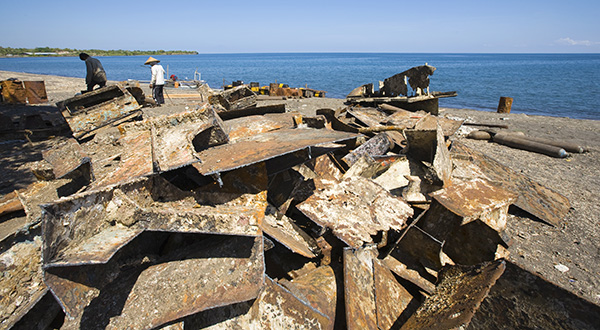NGO Shipbreaking Platform issued its annual report, informing that last year, at least 52 workers lost their lives on the shipbreaking beaches in South Asia. The worst explosion in the history of shipbreaking struck an oil tanker beached in Gadani, Pakistan, killing 28 workers and injuring more than 60.
The report points out the specific case of the major blast on-board an oil production and storage tanker beached at Gadani shipbreaking plot number 56. The blast was caused by several gas cylinder explosions that set fire to large amounts of oil residues and flammable gases left on-board the tanker.
Except the 28 workers killed, an additional 60 workers were reported injured, many in a critical state. Four workers remain missing as their bodies have not been found.
The lack of ambulances made the transport of the injured workers extremely difficult. As there is no medical treatment centre in Gadani, workers had
to be brought to hospitals in Karachi, making it impossible to intervene in time to treat severe injuries.
The tanker that exploded changed flag and name just weeks before it reached the beach of Gadani, but the cash buyer used for the sale of the end-of-life vessel remains unknown. Following the explosion, trade union announced a three day mourning and strike at all yards. The government initially closed the yards in Gadani, banned the import of oil tankers, and has promised a full investigation on the accident.
The explosion on 1 November was the worst blast ever in the shipbreaking industry in terms of fatalities and was caused by gross negligence and
complete disregard of existing standards for safe working conditions.
The organization urges:
- All ship owners globally to use modern industrial ship recycling facilities, that can ensure clean and safe practices in line with international environmental and labour rights standards and not to sell their end-of-life vessels to beach-breaking yards.
- Shipping companies to refer to the European list of ship recycling facilities to select a destination for their vessels.
- Cargo owners and financers to negotiate and demand clean and safe ship recycling from ship owners they do business with, and to ensure that their business partners do not dump old ships on beaches and substandard yards.
- The European Union to maintain high standards when publishing its list of approved ship recycling facilities and not to give in to shipping interests that want to continue earning money by using the dangerous, polluting and low-cost method of beach-breaking.
- The Member States to support the introduction of a financial scheme based on the polluter pays principle that would incentivise ship owners to opt for a ship recycling facility on the EU list.
“We have to end this dangerous work, which not only exploits the poorest, but also puts their lives in danger on a daily basis. It is the EU’s moral duty to defend workers’ basic rights abroad too” said Martin Siecker, European Economic and Social Committee.
Shipbreaking has been declared the most dangerous job in the world by the ILO.
The NGO Shipbreaking Platform is working to ensure that shipping companies sell their obsolete vessels to safe, clean and just recycling facilities. Thanks to the continued efforts of the NGO Shipbreaking Platform and its member organisations, concerned policy makers and industry with a stake in shipping are increasingly echoing this demand.
Further information may be found by reading the full report here.





























































